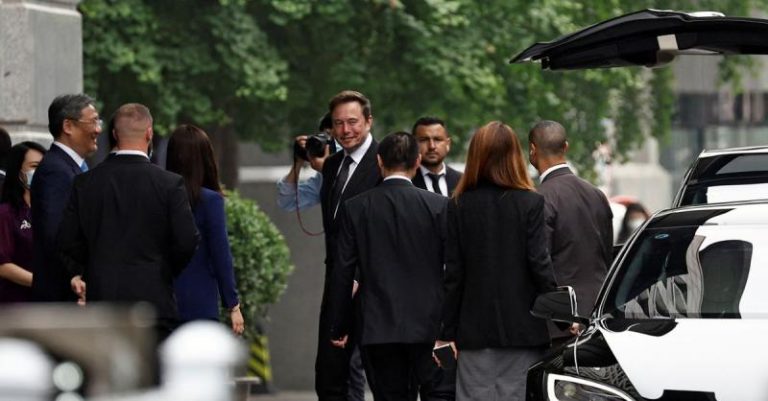
If you watch most American TV networks, you will see an extremely high voltage animosity between America and China. The politicians are scoring points against China. The media is feeding the frenzy. (I expect the same for Chinese TV networks in China). But flip to what leading American business people like Tesla’s Elon Musk, JPMorgan’s Jamie Dimon and Starbucks’ Laxman Narasimhan are doing, you see an entirely different episode.
In other words, the US business community to a large extent seems bent on pursuing opportunities in China even as politicians and the media have different playbooks. When your revenue is not determined by political contacts, you have freedom as a company.
Tesla CEO Elon Musk recommitted to China during his first visit in three years, based on a statement by Chinese officials. Musk met with the country’s foreign minister on Tuesday, and he was quoted as saying U.S. and Chinese interests are linked, and that Tesla is against “decoupling” the nations. China houses Tesla’s largest production facility, and Musk suggested that he intends to expand operations there. He is the latest chief executive to travel to China now that its zero-COVID policy has been revoked, with JPMorgan’s Jamie Dimon and Starbucks’ Laxman Narasimhan also visiting this week. (LinkedIn News)
In your business, do not do “herding” where everyone does the same thing, and see. If you herd, as I noted in Tekedia [check this piece I wrote in Harvard Business Review on the same topic for a special issue on Failure. …This post is part of HBR’s special issue on failure. … As humans, we fear failure. That affects our appetite to take risks. We herd, follow others, miss opportunities to lead. By not taking risk because of exposure to failure, we become less inventive], a new entrant needs just one strategy to annihilate your industry. Yes, since everyone is doing the same thing, conquering the market is easier by a newcomer.
Register for Tekedia Mini-MBA edition 19 (Feb 9 – May 2, 2026): big discounts for early bird.
Tekedia AI in Business Masterclass opens registrations.
Join Tekedia Capital Syndicate and co-invest in great global startups.
Register for Tekedia AI Lab: From Technical Design to Deployment (next edition begins Jan 24 2026).
With America showing different signs to China, the politicians sending high voltage verbal attacks and the businessmen going with flowers and byte-loads of cash (Tesla $2 billion investment), these two countries may just be protecting their castles out of the crosshairs of other countries for a really long time. You do not put $2b when you think someone can blow up that area!
JPMorgan’s Jamie Dimon said on Wednesday there needs to be “real engagement” between the U.S. and China in order to move on from security and trade disputes, which are “resolvable.” In his first visit since expressing regret in 2021 for his comments about China’s ruling party, Dimon is the latest chief executive to travel to the country after its zero-COVID policy was revoked. He is in Shanghai, attending the JPMorgan Global China Summit, as the bank seeks to increase its presence in China, says CNBC. Dimon’s visit comes a day after Tesla CEO Elon Musk’s first trip there in three years.
-
The “growing antagonism” between D.C. and Beijing “contrasts sharply with business leaders who hope to showcase China’s importance to economic growth,” according to Axios.
-
On Tuesday, Musk met with China’s foreign minister and was quoted as saying U.S. and Chinese interests are linked, much like “conjoined twins.”
China’s Foreign Ministry said Elon Musk told officials in Beijing that he opposes decoupling the world’s two biggest economies, in a meeting held shortly after the Tesla CEO arrived in the country.@selina_cheng @DanStrumpfhttps://t.co/Ly6xfxIGVO
— Jonathan Cheng (@JChengWSJ) May 30, 2023
---
Connect via my
LinkedIn |
Facebook |
X |
TikTok |
Instagram |
YouTube


Economics does not bend to politics, rather it’s the other way round, irrespective of what political actors say. You have to know what the numbers say for each market, so even when politicians are ranting and threatening, as a businessperson, you are not expected to join them, except the market in question is not strategic.
The same applies to military line of communication, it does not follow what the political actors say, for all the noise and tension between the US and China, their respective military formations will still maintain communication, to make sure that things don’t carelessly go wrong.
You cannot succeed in the global business space without some dosage of diplomacy, because activism is not what moves the numbers, it’s trade that does, and you have to keep selling in order to remain relevant.
Nobody wants to lose, and you cannot equally acknowledge that your rivals are good enough, so you have to create some talking points, they are all part of gaining more advantage over others. If you cannot sell ‘democracy’, you can as well sell ‘cooperation’, some even sell ‘shared prosperity’ or ‘mutual interest’; everything is sellable, just hawk your products intelligently.